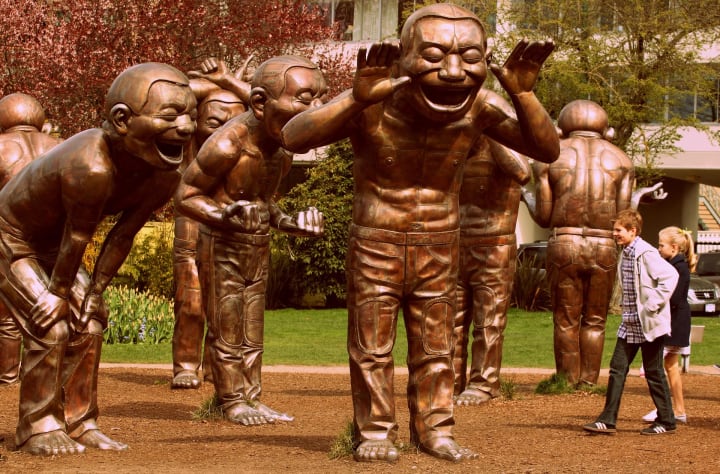
It's hard to define happiness, even if we all seem to be searching for it.
But it's not as elusive or abstract as you may think.
There's the pleasurable, hedonistic kind, where you try to do everything that makes your senses feel good in a particular period of time and everything feels easy.
It’s that “living in the now” sensation that provides immediate satisfaction, that pleasure and the pursuit of it and the avoidance of pain, is the highest good in life. It tends to be associated with physical needs being met, rather than emotional or intellectual ones. We tend to associate happiness more commonly to this concept.
This type of happiness rarely provides sustainable contentment. It provides temporary moments of intense joy that may add to life, but won’t contribute to building a happy life in general.
There's also the concept of happiness being an engaging life, where things aren’t always easy, but you gain immense enjoyment from the network and involvement in work, relationships, and leisure.
And finally the meaningful life, where you test yourself and experience joy from the achievement of overcoming seemingly insurmountable challenges, and identifying and using your strengths for a greater good other than your own individual desires and needs.
It’s the latter two types that we should focus on instead, which take longer, involve more energy, and can cause moments of negative emotions such as anger, impatience, pessimism and doubt – but are par for the course.
This is easier said than done. For instance if you are self-aware and understand your weaknesses as well as strengths, and what your goals are in life, then it will be easier to know what steps to take to change routines and behavior to achieve them. Conversely, without understanding our characters and preferences, it will be difficult to align our values and interests to our actions that result in happiness.
The following are just a few habits that may help you get some clarity, and provide you with concrete tools to manage the ups and downs of life, which will in turn lead to being happier.
1. Focus on your purpose

Some days you may feel a little frantic – running around doing a million things. That can be pretty normal. But if you are finding yourself trying to attend to too many people, issues, and tasks that are widely divergent and it’s difficult to reconcile them all, it might be time to take a breath.
While this is a life-long goal that needs more work than just a few hours, reflecting on it for a few minutes daily will save you oodles of time; instead of wasting your efforts on things that don’t fit into your purpose, you can just say no and move on.
Ask yourself - is what I’m doing and who I think I should be consistent? Are my values matching my actions?
You may have heard people remarking that they don't really know what you feel or think, or have seen you act differently depending on the situation or people who are around. If that's the case, it could be a good indication that you are pretending to be someone else.
In a nutshell, you’re not being true to yourself.
There are obviously times when you dampen your opinions for the sake of not seeming rude, but you can still have an opinion without offending others, and stand by your principles despite what others may think.
More often than not, they will gain newfound respect for you. Take the time to understand your own values and how you can live them out. There’s no need to vocalize them, but simply by the way you do things, people will soon realize you walk the walk, not just talk the talk.
2. Find the humour

It can be difficult at the time, but sometimes a situation is so absurd and seemingly unsolvable that you can only laugh. Other times you have to wait until that moment really has passed before you can even begin to see something in context, and understand exactly how ridiculous it was to be so irritated, upset or affected by a person’s behavior, action, a piece of news, or an event.
3. Try to be present

Consciously choose to have periods of quiet and stillness - whether that be meditation, swimming or walking, doing yoga or simply having a cup of tea and staring at the sky. Stillness and peace calm and soothe harried nerves and worried minds.
Try not to be bothered by what “you have to do” - but leave some time for dreaming and reflecting on what exactly you are running around and doing all "this" for.
4. Have gratitude and be gracious

Whether that be friends, family, your job, or simply the fact you can enjoy the sunshine, smell flowers, and have fresh air, a cup of good coffee, getting a nice message on your phone, an email with a funny joke, someone complimenting you on how you look or some job you did, remembering a moment with someone you love.
One way to help with this is keeping a gratitude journal or a regular list of things that you are thankful for if not daily, then weekly. This gives a sense of accomplishment and focuses the mind on everything that is good in your life and puts you in a good mood.
5. Learn from others about what makes them happy and why

Some of us simply aren’t hard-wired to analyse ourselves on a daily basis and understand what makes us tick.
Luckily, there are a host of researchers, scientists, psychologists and social commentators that make this their full-time job. David Gilbert, Gretchen Rubin, Martin Seligman, and Charles Duhigg are just some of the contemporary authors that have helped the everyday person to understand exactly what it is that makes us happy - by measuring it scientifically through neurology, as well as qualitatively, by monitoring their own behaviour after trying to establish new habits and routines.
Their lessons show that it is entirely possible for humans to re-create their lives, and for our brains to somehow record and remember patterns that help us not only survive but experience contentment.
For most of us, we don’t need such radical changes, but we still want to improve some aspect of our characters. Whether that be communicating with others better, taking the time to reflect and recalibrate, or ensuring our physical well-being is maintained as well as our emotional health, we all need help to understand what we can do to be happier.
6. Change things up

A change is as good as a holiday some people say - and that is true for some who need variety and diversity.
If your job doesn’t provide stimulation in the form of new tasks that are challenging, meeting new people, or different projects in teams, then you may need to find other activities that provide a change of people and environment to motivate you and facilitate different ideas.
Buy some flowers, move your furniture around, hang a new painting, cook something different, strike up a conversation randomly with a stranger.
Try a new tactic of communicating with your colleagues, family and friends and see if you can’t go deeper in these relationships. Or conversely, pare back some friendships that seem damaging or hurtful.
7. Do activities that make you inspired and alive

What is it that makes you feel alive? Listening to music, going to an art exhibition, doing exercise, dancing, gardening, traveling, video games, cooking, or simply hanging out with your friends?
Perhaps you don't have the time to do the things you really love. If so, then try and evaluate what your priorities are.
What kind of person do you want to be remembered as? What kind of life do you want to look back on when you’re older?
Try to set aside an hour a day for an activity that you're passionate about - it's necessary to escape from the humdrum of routine and everyday logistics, and find moments of spontaneity and fun.
And of course, there's no need to try absolutely everything, just start with one thing you like doing and see where it leads you.
8. Eat well

There’s no doubt that sugar and salt highs from junk food produce immediate pleasure. For long-term satisfaction, it’s best to try and eat a balanced diet.
That doesn’t preclude eating fast or processed food entirely, but eating regular meals that have green vegetables, legumes, fish and chicken, and wholegrain cereals help your body function so you have more energy and concentration capacity.
This makes you happier simply because you can fit more into a day. Start with just eating one decent meal a day, or cooking a healthy meal at home.
9. Exercise

There’s absolutely no need to go to the extremes signing up for a triathlon immediately, or five classes of spinning a week and a couple of weight sessions if you aren’t accustomed to exercising.
Start with something fun and easy like dancing or yoga, walking, or a step machine.
You’ll soon notice that apart from more energy, and feeling less stressed, you want to keep doing more exercise. The endorphins and adrenaline we receive from exercise provide a natural high, and relax us after a long day at work or a situation that is overwhelming.
Additionally, focusing on expending physical energy can relieve our minds from working overtime about things we often cannot control.
10. Get forty winks

Sleep is another important habit that many of us attempt to do without in the name of being "supermen and women". But the body requires that your mind and heart and limbs shut down temporarily in order to rejuvenate and repair, ready for another day.
Without this necessary habit, we become stressed, irritable and unpredictable. While it’s possible to function without sleep for a long spell of time, or even prolong staying awake with artificial stimulants, it will eventually catch up with you in some way.
11. Hug someone daily

We all need to feel as if someone else cares about us, and nothing’s better than a hug to make us feel warm, safe and loved. Physical contact for humans is important in establishing and maintaining emotional connections. Words can only do so much, and a hug between loved ones conveys understanding, affection, trust, and comfort.
It could also be a reason many people own a pet – in lieu of a loved one, we can derive great joy from taking care of a dog or cat, and patting them and having them next to us on the couch or at the foot of the bed as we sleep is reassuring.
Happiness is always a work in progress...
Remember that being happy, or striving to be happier, is not just a lifelong journey but something we need to work towards a little each day.
However with a few conscious changes and actions in our lives, it is more than possible to gradually incorporate some habits that will make it easier to create more joy and happiness for ourselves, and those around us.






Comments
There are no comments for this story
Be the first to respond and start the conversation.